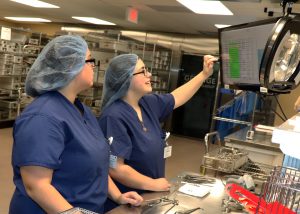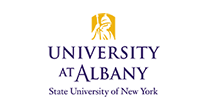News
February 6, 2020February is Career and Technical Education Month
 February is Career and Technical Education Month — a time when school districts across the country celebrate programs designed to prepare students for the workforce or to further their education.
February is Career and Technical Education Month — a time when school districts across the country celebrate programs designed to prepare students for the workforce or to further their education.
Once an education path for those students only seeking vocational skills, career and technical education is now a pathway for students looking to build career skills, get a start on their college education or just learn a life skill that will allow them to pay for college. At Capital Region BOCES Career and Technical School, more than 70 percent of high school students pursue higher education, while many others directly enter the workforce with a highly technical skill set.
For Carlee Badger of Mohonaen, Capital Region BOCES Career and Technical School is providing her skills to enter the world of medicine.
“I want to go into medicine because I like helping people. This is helping to start a career in medicine,” said Badger, a Sterile Processing Technician senior.
Likewise for Dan Reedy of Watervliet, a Career and Technical School education is about learning in a manner that works for him and gaining skills to enter the career of his choice.
“I like that the welding program is physical work instead of sitting at a desk all day and even when we are learning in a classroom at a desk, it’s enjoyable because it’s interesting,” Reedy said before firing up an orbital welder.
Meanwhile, college-bound senior Cadan Landauer found freedom and opportunity at BOCES.
“Attending BOCES gives me freedom. You can choose what you want to do and still learn. I want to go to college for engineering, I just don’t know what type yet,” said the Duanesburg student in the BOCES Engineering Tech program.
That confidence is well founded according to dozens of graduates of Capital Region BOCES.
Take for example 2016 culinary graduate Jessica Shultis, who attended BOCES from the Schalmont schools.
“BOCES prepared us so well for college. Within two or three weeks of getting to SUNY Delhi we made the hot foods (competition) team beating out juniors and seniors. That’s because of what we learned at BOCES,” said Shultis referring to herself and fellow graduate Carly Yezzo.
For 2016 graduate Welding and Metal Fabrication Program graduate Ian Mayo, BOCES allowed him to reach new heights thanks to his time at Capital Region BOCES.
“A job opened up in Middletown and they (the union leadership) were impressed again with my welding, so they sent me there as a full-time journeyman with a full rate of $40.50 an hour plus time-and-a-half and double-time,” said Mayo, who works with the Local 7 UA Plumbers and Steamfitters.
Current senior Brittany Celebucki said learning welding at BOCES allows her to launch a great career without going into debt.
“My sister is in college and it costs so much. The welding program allows you to learn the skills you need for a good career without going to college and taking on all of that debt,” she said.
Capital Region BOCES offers approximately 40 programs that prepare students for specific careers, but also give students such skills as communications, interviewing and time management that span the spectrum of careers.
Those programs are guided by input received from the business community. These professionals serve on 17 different advisory panels that meet periodically at BOCES and guide the curriculum and planning, as well as provide work-based learning opportunities for students.
A key example of the BOCES-business partnership is the new Engineering Technician program launched last September, which is the result of a partnership between BOCES and GLOBALFOUNDRIES. The program will train students for careers at the high tech giant and other employers in the region and beyond.
Another example is the Telecommunication and Network Cabling Technician program that launched in September, 2019 as a result of multiple businesses expressing a need for certified and trained fiber optics technicians, lineman and related skilled professionals.
“There’s a large demand among business leaders across the region and state to place an emphasis on college- and career-readiness,” said BOCES Senior Executive Office Joseph P. Dragone, Ph.D. “We pride ourselves on the partnerships we continue to make with those businesses to ensure that BOCES is a part of the region’s thriving economic machine.”
Indeed, business partners say BOCES and BOCES students play a pivotal role in the success of their companies and the economy.
“We work with BOCES and attract students with skills and then we have to bring them in and mold them to the employee we need,” said Dan Corbett, equipment manager for Lancaster Development.
Corbett said Lancaster enjoys a positive relationship with BOCES and understands that with more open jobs than available employees nationally – 7.5 million agencies with only 6 million able workers – companies have to mold employees.
“Companies today have to work with BOCES to cultivate tomorrow’s employees. Companies that aren’t doing this won’t be here for long.”
Dave Knox, service manager for Colonie Mechanical Contractors, concurred.
“Over the years, we have hired at least six employees that graduated from BOCES’s Heating, Ventilation, Air Conditioning and Refrigeration (HVAC/R) program and we are very satisfied. They are good with their skills, time management and all we ask from them,” he said.
More than 1,100 students from throughout the Capital Region take courses at the Capital Region BOCES campuses in Schoharie, Albany and at the Mohonasen Center for Advanced Technology, as well as New Visions classrooms. Nationally, more than 15 million high school and postsecondary students are pursuing career and technical education, according to the U.S. Department of Education.
By choosing an education that includes career and technical training, those students are getting an education that is critical to their personal success, as well as the success of this region and the country.
























